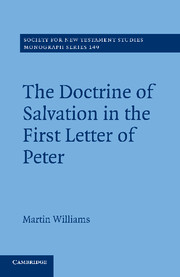8 - The atonement
from Part III - Intercatholic conversation
Published online by Cambridge University Press: 05 November 2011
Summary
Introduction
Early Christian tradition affirms that Jesus’ death was ‘for us’. That is to say, the earliest followers of Jesus were never content with the bare fact that Jesus died but were always concerned with the meaning and significance of that fact. Thomas Oden writes: ‘Christianity proclaims not merely that Christ died, but that his death had significance for the otherwise apparently absurd course of human history.’ As Paul Fiddes asks: ‘We are really asking the question we have often posed before: how does the particular death of Christ so long ago have a crucial effect on our life before God?’ The meaning and significance of the death of Jesus is the subject of the topic of ‘the atonement’. As both 1 Peter and the history of interpretation demonstrate, the meaning and impact of the atonement is a rich and complex subject that cannot be grasped by any one theory, nor fully by any combination of them. By allowing 1 Peter to sit down at the conference table and dialogue with some of the theologies and theologians of the atonement it is hoped that a greater appreciation for the complexity, richness, meaning, and significance of the atonement in general, and in 1 Peter in particular, will emerge.
Jesus’ death as victory
Many early church fathers and a few contemporary theologians interpret the atonement in terms of Christ’s victory over sin, death, and the devil. In fact Gustaf Aulén (1879–1977), the Lutheran theologian from Lund, claimed in his book Christus Victor that it was the ‘classic’ view of the atonement (he also referred to it as the ‘dramatic’ view). The theory itself actually assumes at least two basic forms: (1) some interpreters (generally patristic writers) interpreted Christ’s death as a ransom paid to the devil (see [§3] below), (2) while others, guided by such texts as Col. 2:15, 1 Cor. 15:24–28, 1 Jn 3:8, and Heb. 2:14–15, emphasise Christ’s victory over sin, death, and the devil through the cross and resurrection with no recourse to the notion of a ransom paid to the devil. Aulén explains the central theme of this idea of the atonement ‘as a divine conflict and victory; Christ – Christus Victor – fights against and triumphs over the evil powers of the world, the tyrants under which mankind is in bondage and suffering, and in him God reconciles the world to himself’. Reconciliation is achieved, he suggests, because in his victory over the powers of evil Christ has both taken away their power to harm believers and keep them in bondage (salvation and deliverance) and, as a result, has removed God’s judgment (made atonement).
- Type
- Chapter
- Information
- The Doctrine of Salvation in the First Letter of Peter , pp. 254 - 272Publisher: Cambridge University PressPrint publication year: 2011



